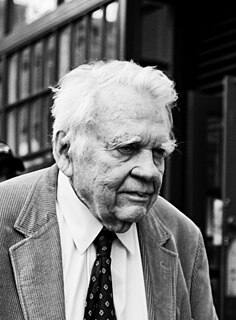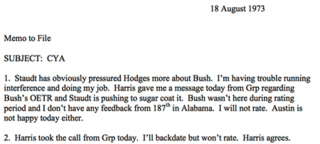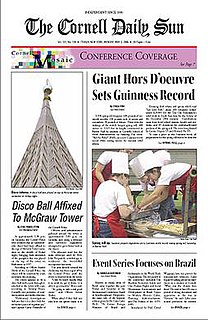Related Research Articles

The Washington Times is an American conservative daily newspaper published in Washington, D.C., that covers general interest topics with a particular emphasis on national politics. Its broadsheet daily edition is distributed throughout the District of Columbia and in parts of Maryland and Virginia. A weekly tabloid edition aimed at a national audience is also published. The Washington Times was one of the first American broadsheets to publish its front page in full color.

60 Minutes is an American television news magazine broadcast on the CBS television network. Debuting in 1968, the program was created by Don Hewitt and Bill Leonard, who chose to set it apart from other news programs by using a unique style of reporter-centered investigation. In 2002, 60 Minutes was ranked number six on TV Guide's list of the "50 Greatest TV Shows of All Time", and in 2013, it was ranked number 24 on the magazine's list of the "60 Best Series of All Time". The New York Times has called it "one of the most esteemed news magazines on American television".

Andrew Aitken Rooney was an American radio and television writer who was best known for his weekly broadcast "A Few Minutes with Andy Rooney", a part of the CBS News program 60 Minutes from 1978 to 2011. His final regular appearance on 60 Minutes aired on October 2, 2011; he died a month later at the age of 92.

The Killian documents controversy involved six documents containing false allegations about President George W. Bush's service in the Texas Air National Guard in 1972–73, allegedly typed in 1973. Dan Rather presented four of these documents as authentic in a 60 Minutes II broadcast aired by CBS on September 8, 2004, less than two months before the 2004 presidential election, but it was later found that CBS had failed to authenticate them. Several typewriter and typography experts soon concluded that they were forgeries. Lt. Col. Bill Burkett provided the documents to CBS, but he claims to have burned the originals after faxing them copies.

Nicholas von Hoffman was an American journalist and author. He first worked as a community organizer for Saul Alinsky in Chicago for ten years from 1953 to 1963. Later, Von Hoffman wrote for The Washington Post, and most notably, was a commentator on the CBS Point-Counterpoint segment for 60 Minutes, from which Don Hewitt fired him in 1974. von Hoffman was also a columnist for The Huffington Post.

Shana Alexander was an American journalist. Although she became the first woman staff writer and columnist for Life magazine, she was best known for her participation in the "Point-Counterpoint" debate segments of 60 Minutes, in the late 1970s, with conservative James J. Kilpatrick.

Cherwell is a weekly student newspaper published entirely by students of Oxford University. Founded in 1920 and named after a local river, Cherwell is a subsidiary of independent student publishing house Oxford Student Publications Ltd. Receiving no university funding, the newspaper is one of the oldest student publications in the UK.

The Cornell Daily Sun is an independent daily newspaper published in Ithaca, New York by students at Cornell University and hired employees.

James Murray Kempton was an American journalist and social and political commentator. He won a National Book Award in 1974 for The Briar Patch: The People of the State of New York versus Lumumba Shakur, et al. Reprinted, 1997, with new subtitle The Trial of the Panther 21. He won a Pulitzer Prize in 1985 "for witty and insightful reflection on public issues in 1984 and throughout a distinguished career."

James Jackson Kilpatrick was an American newspaper journalist, columnist, author, writer and grammarian. During the 1950s and early 1960s he was editor of The Richmond News Leader in Richmond, Virginia and encouraged the Massive Resistance strategy to oppose the U.S. Supreme Court's decisions in the Brown v. Board of Education ruling which outlawed racial segregation in public schools. For three decades beginning in the mid-1960s, Kilpatrick wrote a nationally syndicated column "A Conservative View", and sparred for years with liberals Nicholas von Hoffman and later Shana Alexander on the television news program 60 Minutes.
The Columbia Daily Spectator is the student newspaper of Columbia University. Founded in 1877, it is the oldest continuously operating college news daily in the nation after The Harvard Crimson, and has been legally independent of the university since 1962. It is published at 120th Street and Claremont Avenue in New York City. During the academic term, it is published online Sunday through Thursday and printed once monthly. In addition to serving as a campus newspaper, the Spectator also reports the latest news of the surrounding Morningside Heights community. The paper is delivered to over 150 locations throughout the Morningside Heights neighborhood.

The Cavalier Daily is an independent, student-run daily news organization at the University of Virginia. Founded in 1890, under the name College Topics, The Cavalier Daily is Virginia's oldest collegiate daily and the oldest daily newspaper in Charlottesville, Virginia.

The term right-wing alternative media in the United States usually refers to internet, talk radio, print, and television journalism. They are defined by their presentation of opinions from a conservative or right wing point of view and politicized reporting as a counter to what they describe as a liberal bias of mainstream media.
James Kirchick is an American reporter, foreign correspondent, author, and columnist. He has been described as a conservative or neoconservative.
The Spectrum is a student newspaper published in Buffalo, New York. It is published twice a week at the University at Buffalo.
The Richmond News Leader was an afternoon daily newspaper published in Richmond, Virginia from 1888 to 1992. During much of its run, it was the largest newspaper source in Richmond, competing with the morning Richmond Times-Dispatch. By the late 1960s, afternoon papers had been steadily losing their audiences to television, and The News Leader was no exception. Its circulation at one time exceeded 200,000, but at the time of its closing, it had fallen below 80,000.
Quillette is an online magazine founded by Australian journalist Claire Lehmann. The magazine primarily focuses on science, technology, news, culture, and politics. It also publishes two podcasts, Wrongspeak and Quillette.